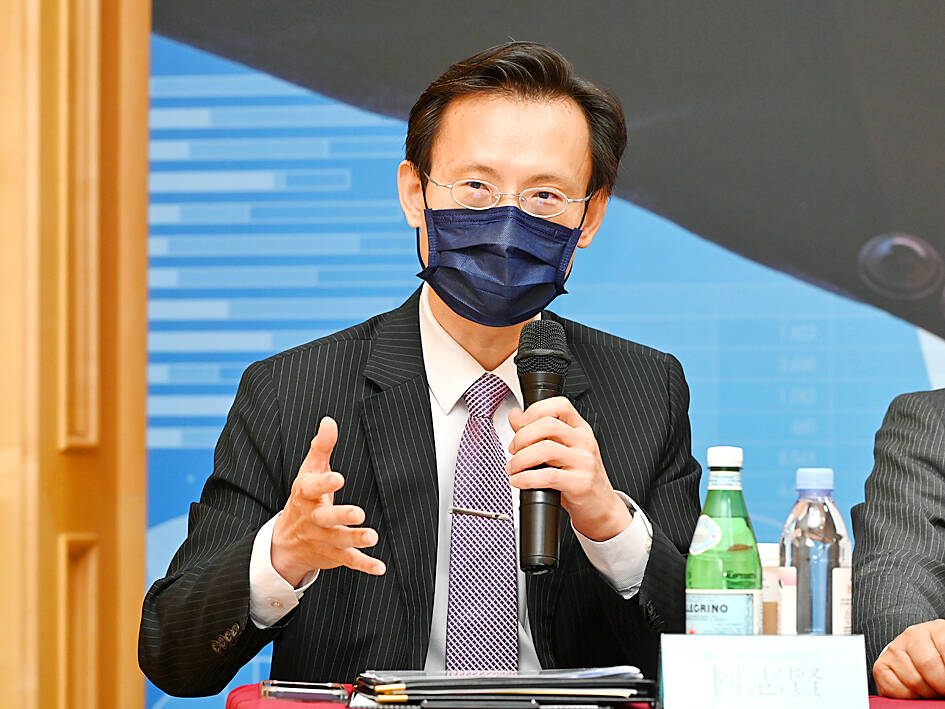The number of initial public offerings (IPO) would rise modestly this year, as the capital market improves in the second half of the year, despite current concerns over global inflation and monetary tightening, Deloitte & Touche Taiwan said on Tuesday.
The number of IPOs on the Taiwan Stock Exchange (TWSE) and Taipei Exchange (TPEX) might reach 50 this year, from 47 last year, led by semiconductor, renewable energy and biotechnology firms, Deloitte & Touche Taiwan CEO Jason Ke (柯志賢) said.
Concerns over inflation, monetary tightening, geopolitical conflicts and carbon emission reductions would remain after playing havoc on financial markets around the world last year, Ke said.

Photo: Tien Yu-hua, Taipei Times
The consultancy’s audit and assurance business leader Titan Lee (李東峰) said that ongoing inventory corrections would end next quarter, paving the way for a recovery in global demand for goods and services.
The US Federal Reserve is likely to slow its pace of monetary tightening or hold steady in coming policy meetings, as inflation-related readings show signs of mitigation, Lee said.
The recent easing of COVID-19 restriction in China would lend support to exports in Taiwan, despite spiking virus infections for the time being, Lee said, adding that Beijing would introduce measures to stimulate the economy after the pandemic stabilizes.
The emerging stock board last year saw 63 new participants intent on listing on the TWSE or TPEX, Lee said.
Stock exchange officials and consultancy firms have said they would resume in-person road shows this year to help boost local capital markets.
Market volatility has not dampened IPO interest on the part of fintech companies seeking to grow and roll out innovative solutions for clients, Deloitte & Touche Taiwan start-up service group leader Connie Chen (陳薔旬) said.

Intel Corp chief executive officer Lip-Bu Tan (陳立武) is expected to meet with Taiwanese suppliers next month in conjunction with the opening of the Computex Taipei trade show, supply chain sources said on Monday. The visit, the first for Tan to Taiwan since assuming his new post last month, would be aimed at enhancing Intel’s ties with suppliers in Taiwan as he attempts to help turn around the struggling US chipmaker, the sources said. Tan is to hold a banquet to celebrate Intel’s 40-year presence in Taiwan before Computex opens on May 20 and invite dozens of Taiwanese suppliers to exchange views

Application-specific integrated circuit designer Faraday Technology Corp (智原) yesterday said that although revenue this quarter would decline 30 percent from last quarter, it retained its full-year forecast of revenue growth of 100 percent. The company attributed the quarterly drop to a slowdown in customers’ production of chips using Faraday’s advanced packaging technology. The company is still confident about its revenue growth this year, given its strong “design-win” — or the projects it won to help customers design their chips, Faraday president Steve Wang (王國雍) told an online earnings conference. “The design-win this year is better than we expected. We believe we will win

Chizuko Kimura has become the first female sushi chef in the world to win a Michelin star, fulfilling a promise she made to her dying husband to continue his legacy. The 54-year-old Japanese chef regained the Michelin star her late husband, Shunei Kimura, won three years ago for their Sushi Shunei restaurant in Paris. For Shunei Kimura, the star was a dream come true. However, the joy was short-lived. He died from cancer just three months later in June 2022. He was 65. The following year, the restaurant in the heart of Montmartre lost its star rating. Chizuko Kimura insisted that the new star is still down

While China’s leaders use their economic and political might to fight US President Donald Trump’s trade war “to the end,” its army of social media soldiers are embarking on a more humorous campaign online. Trump’s tariff blitz has seen Washington and Beijing impose eye-watering duties on imports from the other, fanning a standoff between the economic superpowers that has sparked global recession fears and sent markets into a tailspin. Trump says his policy is a response to years of being “ripped off” by other countries and aims to bring manufacturing to the US, forcing companies to employ US workers. However, China’s online warriors